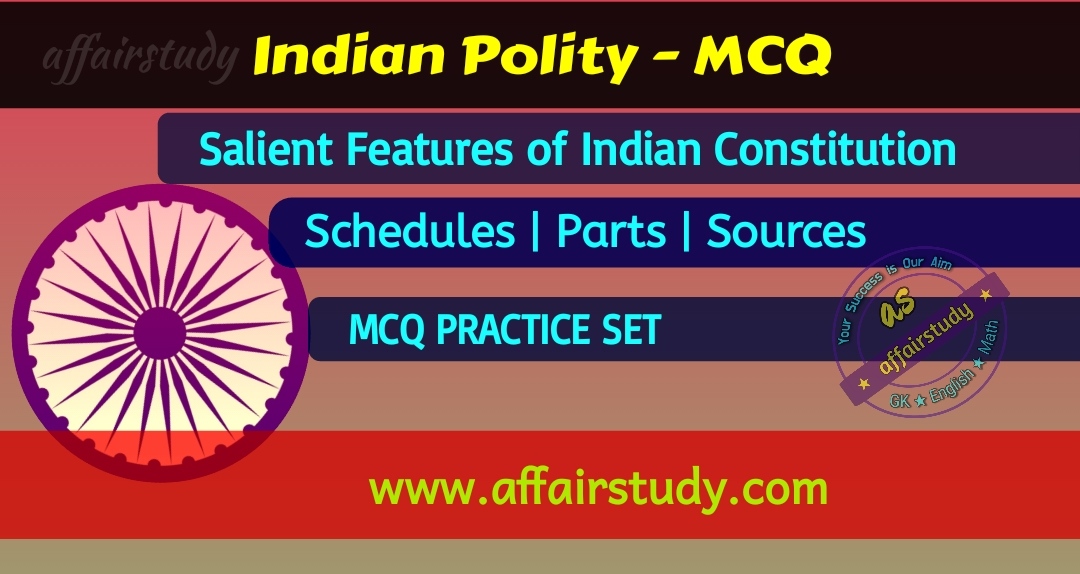Salient Features of Indian Constitution MCQ
India Polity MCQ | Chapter 3
Key Features of Indian Constitution
All of we know that Polity is an important subject for any competitive exam and also it's our duty to know our constitution properly.
In this section, we are sharing the most important MCQs and answers of the Chapter features of the Constitution.
The Chapter Salient Features of the Indian Constitution contains mainly based on three topics. If you want to go through these topics then click on the following link, then practice the following MCQ practice set on Salient Features of Indian Constitution.
Three Chapters are -
Following MCQ provides Multiple Choice Questions (MCQs) related to Salient Features of indian Constitution.
Salient Features of Indian Constitution | Polity MCQ | Chapter 3
1. Consider the following statements:
The Indian Constitution is:
i. an unwritten constitution.
ii. a written constitution.
iii. largely based on the Government of India Act, 1935.
iv. a gift of British Parliament.
Of these statements
The Indian Constitution is:
i. an unwritten constitution.
ii. a written constitution.
iii. largely based on the Government of India Act, 1935.
iv. a gift of British Parliament.
Of these statements
ii and iii are correct
2. Which of the following statements about the Constitution of India is/are correct?
i. Popular sovereignty and adult franchise are the basic features of the Constitution.
ii. The Constitution, in so far as the division of powers between the Centre and the States is concerned, is rigid.
iii. The Constitution recognises the interdependence of civil and economic rights.
iv. The Constitution mentions direct control by the people such as referendum, initiative and recall.
Select the correct answer from the codes given below
i. Popular sovereignty and adult franchise are the basic features of the Constitution.
ii. The Constitution, in so far as the division of powers between the Centre and the States is concerned, is rigid.
iii. The Constitution recognises the interdependence of civil and economic rights.
iv. The Constitution mentions direct control by the people such as referendum, initiative and recall.
Select the correct answer from the codes given below
i, ii and iii.
3. Which one of the following Schedules of the Constitution of India incorporates salaries and al-
lowances of members of Parliament, the Chairman and Deputy Chairman of the Rajya Sabha,
and Speaker and Deputy Speaker of the Lok Sabha, as one of the item
Second Schedule.
4. The Second Schedule of the Constitution of India does not contain the provisions as to who
among the following?
The Chairman, Union Public Service Commission.
5. Which one of the following statements correctly describes the Seventh Schedule of the Constitu-
tion of India?
It lists distribution of powers between the Union and the States.
6. B.R. Ambedkar was elected to the Constituent Assembly from
Bombay Presidency.
7. The concept of ‘Judicial Review’ in India has been adopted from the
Constitution of
U.S.A
8. The idea of the Preamble has been borrowed in Indian Constitution from the Constitution of
U.S.A.
9. The Constitution of India provides for ?
The Constitution of India provides for Single Citizenship .
10. The concept of ‘A Union of States in the Indian Constitution’ has been derived from
The British North-American Act.
11.There were originally how many Articles in the Constitution of India?
395 Articles.
12. Total numbers of Articles and Schedules in Constitution, calculation or numbering wise is
395 Articles, 12 Schedules.
13.The feature of Federal system of Indian Constitution is inspired by the constitution of
Canada.
14. Total number of Schedules in the Constitution is
Total number of Schedules in the Constitution is 12.
15.Concurrent List included in Indian Constitution is given by
Australia.
16. To give constitutional protection, state land reforms laws have been included in the [
9th Schedule.
17. Indian Constitution has taken a certain feature of the Constitution of other countries, which country has contributed to the framing of the ‘Directive Principles of State Policy’
Ireland.
18. Constitution’s Tenth Schedule relates to
Constitution’s Tenth Schedule relates to anti-defection Law.
19. The right of the government to impose taxes and fees is provided in which List of Constitution?
VII Schedule.
20. The concept of Fundamental Duties has been taken from
Russian (Former Soviet Union) Constitution.
21. Which one of the following is in the State List? ?
Railway Police.
22. The tradition of written Constitution began from which of the following countries?
America<.
23. Land Reform comes under the subjects of
State List.
24.Which of the following characteristics is common between the Federal system of India and America?
A Federal Supreme Court for Interpretation of the Constitution.
25. ‘Marriage’, ‘Divorce’ and ‘Adoption’ are an entry in the Seventh Schedule of the Constitution under the following.
List III - Concurrent List.
This page contains:
key features of Indian constitution, main features of Indian constitution, important features of Indian constitution, salient features and characteristics of Indian Constitution, Multiple Choice Questions of Indian polity, MCQ on Indian Constitution
Read Also...








0 Comments
I hope you liked the Post. Share it with your friends and if you have any suggestion, feel free to enter your comment in the comment box.